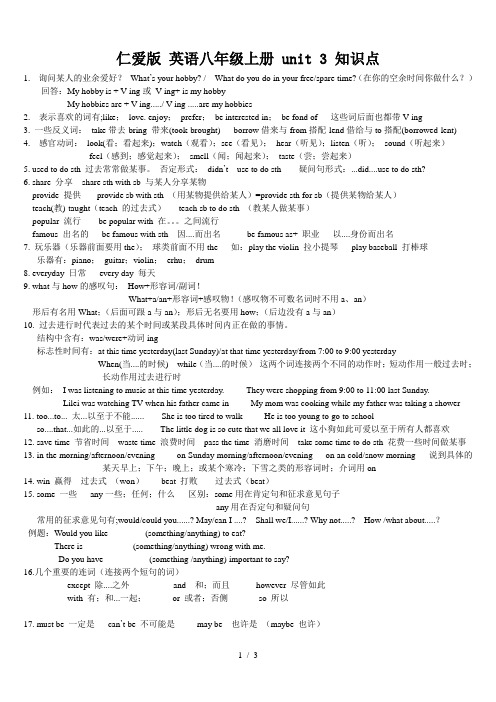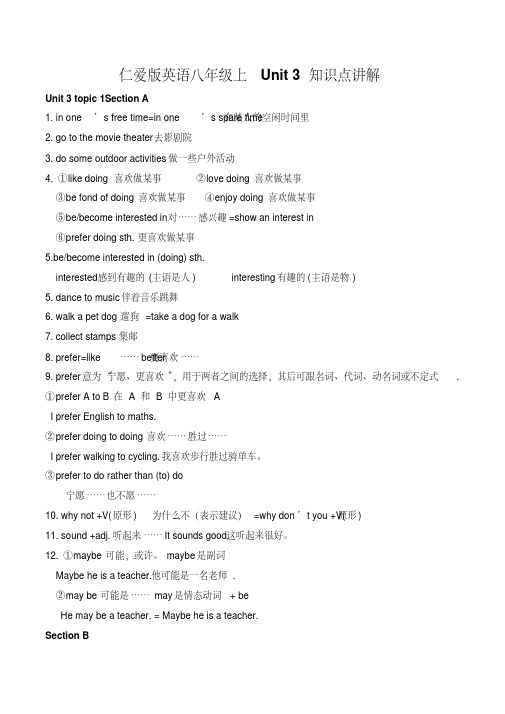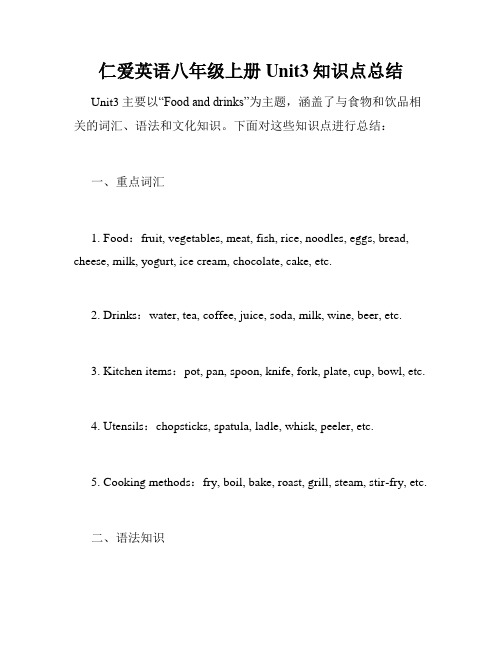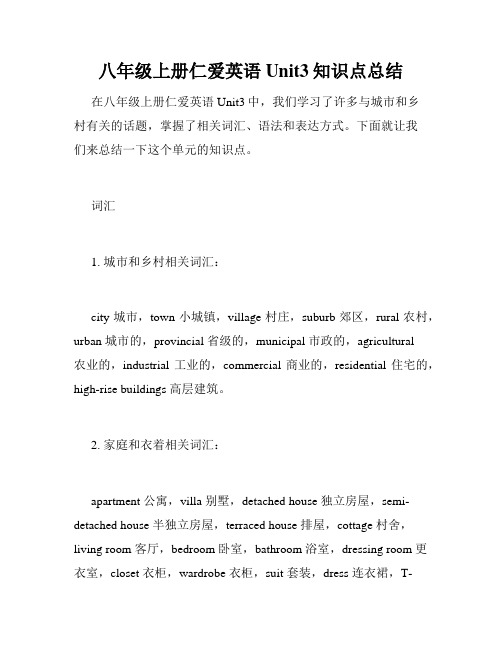仁爱英语八年级上册Unit3知识点总结学生用
仁爱版 英语八年级上册 unit 3 知识点

仁爱版英语八年级上册 unit 3 知识点1.询问某人的业余爱好?What’s your hobby? / What do you do in your free/spare time?(在你的空余时间你做什么?)回答:My hobby is + V-ing或V-ing+ is my hobbyMy hobbies are + V-ing...../ V-ing .....are my hobbies2. 表示喜欢的词有;like;love. enjoy;prefer;be interested in;be fond of 这些词后面也都带V-ing3. 一些反义词:take带去-bring 带来(took-brought) borrow借来与from搭配-lend借给与to搭配(borrowed-lent)4. 感官动词:look(看;看起来);watch(观看);see(看见);hear(听见);listen(听);sound(听起来)feel(感到;感觉起来);smell(闻;闻起来);taste(尝;尝起来)5. used to do sth 过去常常做某事。
否定形式:didn’t use to do sth 疑问句形式:e to do sth?6. share 分享- share sth with sb 与某人分享某物provide 提供- provide sb with sth (用某物提供给某人)=provide sth for sb(提供某物给某人)teach(教)-taught(teach 的过去式)teach sb to do sth (教某人做某事)popular 流行be popular with 在。
之间流行famous 出名的be famous with sth 因....而出名be famous as+ 职业以....身份而出名7. 玩乐器(乐器前面要用the);球类前面不用the 如:play the violin 拉小提琴play baseball 打棒球乐器有:piano;guitar;violin;erhu;drum8. everyday 日常every day 每天9. what与how的感叹句:How+形容词/副词!What+a/an+形容词+感叹物!(感叹物不可数名词时不用a、an)形后有名用What;(后面可跟a与an);形后无名要用how;(后边没有a与an)10. 过去进行时代表过去的某个时间或某段具体时间内正在做的事情。
仁爱英语八年级上册Unit3知识点

仁爱英语八年级上册Unit3知识点本文将详细介绍仁爱英语八年级上册Unit3的知识点,包括重要的单词、表达方式以及语法结构等。
帮助学生更好地掌握此单元的知识,顺利完成学习任务。
一、重要单词1. grade 年级2. schedule 时间表3. term 学期4. memorize 记忆5. revise 复习6. grab 抓住7. cheat 作弊8. summarize 总结9. assignment 作业10. participate 参加二、表达方式1.询问日程安排What’s your schedule like tomorrow?明天你的日程安排怎么样?2. 描述个人喜好及习惯I like studying English every morning.我喜欢每天早上学习英语。
3. 表达自己的看法In my opinion, English is not too difficult.在我看来,英语并不是太难。
4. 建议You should practice speaking English more often.你应该经常练习说英语。
5. 感叹What a difficult test it is!真是一张难题卷!三、语法结构1. 现在进行时现在进行时表示正在进行的动作或状态,常与now、at the moment连用。
例如:I’m doing my homework now.我正在做作业。
2. 过去完成时过去完成时表示过去某一时刻或动作之前完成的动作。
例如:By the time the party began, I had finished my work.派对开始时,我已经完成了自己的工作。
3. 定语从句定语从句用来修饰名词或代词,常用关系代词who、whom、that、which引导。
例如:The girl who is sitting next to me is my sister.坐在我旁边的女孩是我妹妹。
仁爱版英语八年级上Unit3知识点讲解

仁爱版英语八年级上Unit 3 知识点讲解Unit 3 topic 1Section A在某人的空闲时间里1. in one’s free time=in one’s spare time2. go to the movie theater 去影剧院3. do some outdoor activities 做一些户外活动4. ①like doing 喜欢做某事②love doing 喜欢做某事③be fond of doing 喜欢做某事④enjoy doing 喜欢做某事⑤be/become interested in 对……感兴趣=show an interest in⑥prefer doing sth. 更喜欢做某事5.be/become interested in (doing) sth.interested感到有趣的(主语是人) interesting有趣的(主语是物)5. dance to music 伴着音乐跳舞6. walk a pet dog 遛狗=take a dog for a walk7. collect stamps 集邮更喜欢……8. prefer=like……better9. prefer意为“宁愿、更喜欢”,用于两者之间的选择,其后可跟名词、代词、动名词或不定式.①prefer A to B 在 A 和 B 中更喜欢 AI prefer English to maths.②prefer doing to doing 喜欢……胜过……I prefer walking to cycling.我喜欢步行胜过骑单车。
③prefer to do rather than (to) do宁愿……也不愿……10. why not +V(原形) 为什么不(表示建议)=why don’t you +V(原形)11. sound +adj. 听起来……It sounds good.这听起来很好。
仁爱英语八年级上册Unit3知识点总结

仁爱英语八年级上册Unit3知识点总结Unit3主要以“Food and drinks”为主题,涵盖了与食物和饮品相关的词汇、语法和文化知识。
下面对这些知识点进行总结:一、重点词汇1. Food:fruit, vegetables, meat, fish, rice, noodles, eggs, bread, cheese, milk, yogurt, ice cream, chocolate, cake, etc.2. Drinks:water, tea, coffee, juice, soda, milk, wine, beer, etc.3. Kitchen items:pot, pan, spoon, knife, fork, plate, cup, bowl, etc.4. Utensils:chopsticks, spatula, ladle, whisk, peeler, etc.5. Cooking methods:fry, boil, bake, roast, grill, steam, stir-fry, etc.二、语法知识1. 句式结构本单元主要强调疑问句和否定句的结构。
疑问句:询问偏爱的食物和饮品What’s your favorite food/drink?Do you like…?Would you like…?否定句:是否定偏爱的食物和饮品I don’t like…/I dislike…I’m not fond of…I can’t stand…2. 情态动词本单元中出现了两个情态动词,分别是should和must。
should 表示应该做某事或者建议做某事;must则表示强烈的义务和必要性。
You should eat more vegetables.You must finish your homework before you watch TV.三、文化知识1. 饮食文化我们可以通过学习不同国家的饮食文化来了解他们的文化和生活方式。
新仁爱版英语八年级上册unit3重点短语和句子

新仁爱版英语⼋年级上册unit3重点短语和句⼦新仁爱版英语⼋年级上册unit3重点短语和句⼦Unit 3 Topic 1 总结学案⼀、重点词组1 .like / love / enjoy doing sth.喜欢做某事be interested in doing对做某事感兴趣be fond of doing sth喜欢做某事prefer doing sth.更喜欢做某事2.hate doing sth. 讨厌⼲…3.go fishing/ go traveling/go swimming 去钓鱼 /去旅⾏/ 去游泳4.listen to music 听⾳乐5. go out (for a walk )出去(散步)6. do some outdoor activities进⾏户外运动7. play computer games 玩电脑游戏8.watch movies 看电影9.walk a pet dog/keep pets遛狗 /饲养宠物10. collect stamps 收集邮票11.climb mountains 爬⼭12.fly kites 放风筝13.model planes 飞机模型14.keep pets 养宠物15. start /begin with …以……开始16. share sth with sb 与某⼈分享17.provide sb with sth /provide sth for sb 为某⼈提供某物Eg.Our school provides us with free Lunch.18. in one’s life /lives在某⼈的⼀⽣中19. cut out 剪下20.more than =over 超过 /多于21.take a bath 淋浴22.take sb/sth out for a walk带某⼈/某物出去散步23.be special to sb对某⼈来说是特殊的24. go to the movie theater去电影院25.in one’s free time在某⼈的业余时间26.dance to music 伴着⾳乐跳舞27. Not all 并⾮所有28.call sb. sth. 把某某称之为….29. just like 就像…30.learn…from 从…学到31. learn /know about 了解32. talk about 谈论33.sounds good 听起来很好34.stick ...to ...粘贴到…/doc/5115011201.htmled to do sth . 过去常常⼲…否定: didn’t use to do sth. ⼀般疑问句:Did sb use to do sth ?①.I used to collect stamps, but now I hate it.②. He didn’t use to play computer games , but now he likes it.③. What hobby did you use to have?=Our school provides free lunch for us.⼆、重点句⼦1.What do you do in your free time ?在空闲时间⾥你做什么?2.What’s your habby?你的爱好是什么?3.Why not go out and do some outdoor activities?为什么不出去做户外活动?4.Kangkang is fond of swimming 康康喜欢游泳5.I used to enjoy pop music ,but now I don’t like it。
八年级上册仁爱英语Unit3知识点总结

八年级上册仁爱英语Unit3知识点总结在八年级上册仁爱英语Unit3中,我们学习了许多与城市和乡村有关的话题,掌握了相关词汇、语法和表达方式。
下面就让我们来总结一下这个单元的知识点。
词汇1. 城市和乡村相关词汇:city 城市,town 小城镇,village 村庄,suburb 郊区,rural 农村,urban 城市的,provincial 省级的,municipal 市政的,agricultural农业的,industrial 工业的,commercial 商业的,residential 住宅的,high-rise buildings 高层建筑。
2. 家庭和衣着相关词汇:apartment 公寓,villa 别墅,detached house 独立房屋,semi-detached house 半独立房屋,terraced house 排屋,cottage 村舍,living room 客厅,bedroom 卧室,bathroom 浴室,dressing room 更衣室,closet 衣柜,wardrobe 衣柜,suit 套装,dress 连衣裙,T-shirt T恤衫,trousers 长裤,jeans 牛仔裤,skirt 裙子,jacket 夹克,coat 大衣。
3. 时间和工作相关词汇:weekdays 工作日,weekends 周末,Monday 星期一,Tuesday星期二,Wednesday 星期三,Thursday 星期四,Friday 星期五,Saturday 星期六,Sunday 星期日,morning 上午,afternoon 下午,evening 晚上,night 夜晚,office 办公室,factory 工厂,mining 矿业,farming 农业,medicine 医学,business 商业。
语法1. 现在进行时现在进行时表示正在进行的动作,由“be动词+动词的现在分词”构成,结构为:主语+am/is/are(be动词)+动词的现在分词。
最新仁爱版八年级英语上册unit3知识点总结
Unit 3 Our Hobbies1.What′s your hobby?你的爱好是什么2.I like/love prefer=enjoy=be fond of+doing sth/be interested in doing sth3.In one′s free time= In one′s spare time=when+主+be free在某人的业余时间4.Read stories 读故事5.listen to music 听音乐6.recite poems 背诵诗7.go to the movie theater去电影院(去看电影)8.Rent DVDs 租光盘9.sounds good 听起来很好10.need a change 需要改变一下11.change one′s clothes 更换某人的衣服12.Go fishing 去钓鱼Dance to music随着音乐起舞13.It is great fun(名)很有趣14.Why not =why don’t you+do 为什么不15.Maybe 一个单词句首状语可能16.May be 两个单词句中谓语可能(是)17.Not all 不全部18.must be 一定(是)19.Can′t be 不可能(是)20.Learn from+人或物向某人学习-----从某事中学到了什么21.It certainly is.的确是22.主+used to do sth 过去常常做某事23.主+didn′t use to do sth过去常常不做某事24.主+usedn′t to do sth过去常常不做某事25.Be used doing sth习惯做某事26.Call sb/sth把某人或某物称为27.Need sb to do sth需要做什么28.It is easy to get started开始很容易29.Finish school毕业30.Provide sb with sth 给某人提供某物31.Whether to do 是否做某事32.whether or not/ whether or not是否,无论,不管33.take 人/物out for a walk带某人或某物出去散步34.a little friend小朋友35.人/物+be +形+to sb36.It is +形+for sb + to do sth37.Look like = be like 看起来一样(像)38.Be +of+抽象名词=be +形39.It is my pleasure名词40.I′m pleased to do sth形(人主)41.It is very pleasant 形(物主)42.Share sth with sb与某人分享某物43.Pay +人(+钱)酬谢某人(多少钱)44.Pay +钱+for+物为某物付多少钱45.Walk +动物遛46.By oneself= on one′s own 独自47.Hobby---hobbies 爱好48.Friend(朋友)—friendly(友好的)—friendship(友谊)—unfriendly(不友好的)49.Lend sb sth=lend sth to sb向某人借某物(借出)50.Borrow sth from sb从某人借来某物(借入)51.This Sunday evening这周六下午(不用介词on,in,at)52.At the concert 在音乐会53.Give the concert开音乐会54.At the Music Hall在音乐大厅55.What a pity 多么可怜56.Each +of+名复+谓动单三57.What kind of+名单/不可数名词什么种类的58.Folk music 民族音乐(special)classical music古典音乐(serious)Rock music摇滚音乐(noisy)pop music流行音乐(love and everyday life)59.Country music乡村音乐jazz爵士音乐(sweet,exciting,wonderful)60.Be popular with sb 深受某人的喜爱61.Just so-so一般般62.Hate to do sth讨厌做某事63.Hate doing sth一直讨厌做某事64.Be famous for=be well-known for因而著名以而闻名65.Be famous as= be well-known as以某种身份而著名,被公认为e and go quickly67.At the age of+数字=when 主+was/were +数字+years old68.Begin/start to do sth/doing sth开始做某事69.As+形/副as 和一样70.Take music lessons = have music lessons上音乐课71.No one =nobody没有人72.So well 副修饰副73.Such a funny story 形修饰名74.Ask sb to do sth 让/要求某人做某事75.Teach sb todo sth 教某人做某事76.All kinds of 各种各样的77.Different kinds of不同种类的78.What a/an +形+名单79.What+形+名复80.What+形+不可数名词81.How +形+主+谓82.How +副+主+谓83.It is fun形84.It is great fun名85.Set up=form组建,建立,构成86.Another+数+名复另外的87.数+more+名复另外的88.Call sb to do sth给某人打电话做某事89.Speak to 与某人通话90.Hold the line=hold on=wait a moment 等一会91.Take a shower=have a shower=take a bath=have a bath92.Do some doing93.主+is/am/are doing sth +一段时间/now 现在进行时94.主+was/were doing sth +某一时刻/一段时间+过去时间过去进行时95.Be back 回来96.From从 A to到 B =between A and B (A和B之间)97.Chat with friends与朋友聊天98.Plant trees植树99.Visit a museum参观博物馆100.Practice English练习英语101.Eat Beijing roast duck吃北京烤鸭102.Agree with sb同意某人的看法103.Agree to do sth 同意做某事104.Agree on/about sth在某事上取得一致意见105.Agree+that 从句106.Isn′t it interesting?它没趣吗107.Yes, it is 不的,它有趣108.No, it isn′t 是的,它没趣109.You are quite right 你说的相当对111.I agree with you-----I don’t agree with you 我(不)同意的的看法112.I think so------I don’t think so 我(不)这么认为113.Watch a movie = see a film看电影114.Be afraid of doing sth担心,恐怕做某事115.Be afraid to do sth 害怕,不敢做某事116.On the last evening of the year=on a new year′s Eve在除夕夜前夕117.Get together团聚,聚在一起118.In a low voice(低声地说)---in a high voice(高声地说)119.Pass by 经过,路过120.Fall down摔倒,倒塌121.Hear sb to do sth 听见某人做某事(习惯,经常)123.Hear sb doing sth 听见某人正在做某事(正在做)124.Hear +that从句听说125.Warm sb up使某人变暖126.a/an+序数词+名单127.wake sb up叫醒某人128.knock off/on 敲(门)e out出来130.主+系+too+形+to do sth=主+系+so+形+that+否定句太而不能131.主+谓+too+副+to do sth=主+谓+so+副+that+否定句如此以至于132.In the 1800s在19世纪133.In the early/late 1800s在19世纪早期或晚期134.Before 1800在1800年以前135.In 1800在1800年136.By 1800到1800年137.Make Saturday afternoon a holiday把周六下午定位假期138.At the beginning of在的开始139.The beginning of 的开始140.learn...from 向。
仁爱版英语八年级上册u3t1知识点
仁爱版英语八年级上册u3t1知识点本文将为大家介绍仁爱版英语八年级上册 Unit 3 Topic 1 的知识点。
该部分内容主要涉及基本单词、词组、句子及语法知识。
下文将分别进行介绍。
一、基本单词1. 动词:1)inflict:v. 使遭受痛苦,使受惩罚2)limit:v. 限制,约束,限定2. 名词1)struggle:n. 奋斗,斗争,努力2)limitation:n. 限制,局限性3. 形容词1)fierce:adj. 凶猛的,猛烈的,狂热的2)pathetic:adj. 可怜的,悲哀的,引起怜悯的二、词组1. inflict punishment on sb.:对某人施加惩罚2. limit sb./sth. to sth.:将某人/某事物限制在某种程度上3. struggle for sth.:为某事物而奋斗4. pathetic sight:可怜的景象5. in fierce competition:在激烈竞争中三、句子1. The cruel dictator inflicted severe punishment on those who opposed him.2. The teacher limited the number of words the students could usein their essays to 500.3. Many people struggle for their dreams all their lives.4. The beggar on the street was a pathetic sight to behold.5. The two companies were in fierce competition for the market share.四、语法知识1. To 形式的不定式在英语中,to 形式的不定式可以当作名词、形容词或副词使用。
Unit 3 Topic 3知识梳理仁爱版英语八年级上册
Unit3 Topic3知识梳理一.重点单词serve (v.) ——service(n.) chat(v.)——chatting (v-ing.) sell(v.)——sold(过去式) goose (n.)——geese(pl.) dead(adj.)——die (v.) beat(v.)——beat(过去式) wake(v.)——woke(过去式) happy(adj.)——happily(adv.) close(v.)——closed(adj.)二·词组Section A1.hold the line=hold on 保持通话2.answer the phone 接电话3.go to the English Corner 去英语角4.call sb. to do sth. 叫某人去做某事5.take/have a shower/bath 洗澡6.at this time yesterday 昨天的这个时候7.chat with sb. 跟某人聊天8. △pass the time 消磨时间9.△do some packing 打包10.serve the food 提供食物11. △eat the Beijing roast duck 吃北京烤鸭Section B12.agree with sb. 同意某人13.collect stamps 收集邮票Section C14.get together 团聚15.with no shoes= without any shoes 没穿鞋16.in a low voice 低声地17.pass by 路过18.fall down 落下来19.blow strongly 猛烈地吹20.be afraid to do sth. 害怕做某事21.warm sb. up 温暖某人22.go out 外出23.a fourth match 又一根火柴24.△ hold sb. in one’s arms 把某人搂在怀中25. on the morning of 在......的早上26.△lie against the wall 靠墙躺着27. wake up 醒来28. come out of 从......出来29. knock at 敲门Section D30. in the early/middle/late 1800s 在十九世纪初期/中期/晚期31. stop doing sth. 停止做某事32. solve the problem 解决问题33. in the 1960s 在20世纪60年代34. a two-day weekend 一个两天的周末35. too...to 太......以至于......36. be closed 关着的37. keep the door closed 关着门38. the beginning of 在......的开始39. call it a “holy day” 把它称作“神圣的一天”40. △by 1930 在1930年之前三.重点句子1. The telephone rings while Jane is practicing the violin.当简正在练习小提琴的时候,电话响了。
仁爱版八年级英语上册Unit 3 Topic 3 重点知识点总结
仁爱版八年级英语上册Unit 3 Topic 3 重点知识点总结一,词组:1,answer questions回答问题2,take a shower/bath洗澡3,serve the food端上饭菜4,chat with与...聊天5,a piece of news一条新闻6,agree with sb同意某人的看法7,a useful book一本有用的书8,practice doing练习做某事9,hold the line不挂电话线10,answer the phone接电话11, at this time yesterday昨天的这个时候12,call sb to do sth打电话叫某人做某事13,wash clothes洗衣服14,do some cleaning做打扫15,a basketball game/match一场篮球比赛16,in a low voice低声地说17,beat sb/团队:打败某人或团队18,wake up醒来19,solve the problem解决问题20,laugh at sb嘲笑某人21,make faces at朝...做鬼脸22,on the last evening of the year旧历年的最后夜晚23,get together团聚24,in one’s hands在某人手中25,pass by经过26,fall down掉下,摔倒27,be afraid to do/of doing sth害怕做某事28,warm sb up使某人温暖29,go out 熄灭30,light a fourth match又划一根火柴31,take sb with sb把某人带上32,lie against the wall靠着墙躺33,knock at/on敲34,enjoy the moon赏月35,at church在教堂36,in the 1800s在19世纪37,stop doing sth停止做某事38,stop to do sth停下来做另一件事39,on Monday mornings在周一早上40,keep the door closed保持门关着二,重点句子:1,The telephone rings while she is practicing the violin.当她正在练习小提琴时,电话响起了。
- 1、下载文档前请自行甄别文档内容的完整性,平台不提供额外的编辑、内容补充、找答案等附加服务。
- 2、"仅部分预览"的文档,不可在线预览部分如存在完整性等问题,可反馈申请退款(可完整预览的文档不适用该条件!)。
- 3、如文档侵犯您的权益,请联系客服反馈,我们会尽快为您处理(人工客服工作时间:9:00-18:30)。
仁爱英语八年级unit 3知识点归纳topic 1 What’s your hobby一.重点词汇_______ 爱好_________假期 _______ 绘画 __________友谊 ____________ 知识______每日的 _______ 是否________例如 ____________ 过去常常做某事________ 洗澡______________对……感兴趣__________ 跳舞 ___________划船 ____________ 打排球________游泳 _________ 画画 ___________集邮 _____________ 收藏硬listening to ______ /_______music 听流行、古典音乐walking in the countryside____________二.重点句型:1.wow! so many stamps!(page 53)哇,那么多的邮票!本句意为:there are so many stamps. so many意思是“______”,so much意思也是“______”。
如:1)there are so many flowers. or: so many flowers!这里有这么多的花。
2)there is so much water on the table. or: so much water!桌子上有那么多的水。
2. we can learn a lot about people, places, history, and special times from stamps. (page 53)通过这些邮票我们可以学到许多关于人文、地理、历史和特殊时代的知识。
a lot “许多、大量”,用在动词后,同_________。
如:另外,a lot of 和lots of 的意思也是“许多、大量”,要用在____词前,在肯定句中常代替much,many。
在口语中尤其如此。
a lot of和lots of之间没有多大区别,都可以与可数名词和不可数名词连用。
与不可数名词连用时,动词用____数,与可数名词连用时,动词用______数。
3.would you like to collect any of these things? (page 53)你想集下面这些东西吗?would you like to +动词_______,表示“想要……”4. what things do you love collecting? (page 53)你喜欢集什么东西?love + ______表示“喜欢、爱好”,也可以用________表示。
5.Iam interested in playing sports. (page 54)我对运动感兴趣。
be interested in (doing) sth. “对……感兴趣”如:1)i am interested in reading books.我对读书特别感兴趣。
2)jack is interested in football.杰克对足球很感兴趣。
6.what do you often do in your______ time? (page 55) 在你的业余时间里面你都做些什么啊?_________________“在业余时间”“在闲暇之际”,也可用__________________替换。
如:在闲暇之际,我常去看电影。
________________________________________________________ 7. I often go fishing. (page 55)我经常去钓鱼。
go + doing表示“去做某事”go +v-ing结构很常用,多用于体育活动和业余娱乐活动。
如:另外还有:go hunting去_____ go shooting去_____ go swimming,________go bathing 去______ go shopping_________, go climbing ________8.and I do a lot of reading. (page 55)我通常都是阅读一些书籍。
在英语中有不少由“do + doing”的结构,表示“干某事”。
如:________do some cleaning______ do some walking _________do some reading________ do some washing do some shopping_______9.I’m a movie fan. 我是一个电影迷。
fan(运动、电影等)狂热爱好者。
如:a film / football / star fan 同时,fan作为名词还有“风扇”的意思。
如:electric fan 电扇。
10.why not go out and do some outdoor activities? (page 55)为什么不走出去做一些户外运动呢?这是一个省略句,全句可以说成why shall we not go out and do some outdoor activities?常在口语中使用,用来征求对方的意见或表达建议。
使用这种句子必须要有上下文,如:why not meet at the school gate?我们在校门口见面好吗?/ why not run a little faster?为什么不跑快一点呢?some“一些、几个”,用在疑问句中, 表示希望得到肯定回答。
如:1)would you like to give us some good advice?请给我们一些好的建议好吗?2)would you like some coffee or tea?请问,你是想喝咖啡还是茶?11.my interests are changing all the time. (page 56) 我的兴趣爱好总是在不断地改变。
all the time“总是、一直”。
如:why are you playing all the time? 你为什么总是玩啊?look at these monkeys, they are jumping all the time.看看这些猴子,它们一直跳个不停。
12. and i wasn’t interested in sports at all. (page 56)我对运动一点兴趣都没有。
not...at all “一点也不……”;“全然不”。
如:i didn’t mind it at all. 我一点也不在意。
—thank you for helping me.谢谢你帮助我。
—not at all.没关系。
he didn’t know that at all. 他对此事一无所知。
13. but now, my hobbies are sports, like soccer and swimming. (page 56)但是现在我的爱好是体育,比如足球和游泳。
like “像……,好比……”。
如:he swims very quickly like a fish.他游泳非常地快,像一条鱼。
14.I never miss any important soccer games. (page 56)我从未错过任何一场重要的足球比赛。
never “未曾、从未”,表示否定。
如:I have never met him before.我以前从未见过他。
16. I enjoy listening to rock music. (page 56)我喜欢听摇滚音乐。
like, love, enjoy和prefer,这四个词都有“喜欢”之意,但用法不同。
试比较:like意为“喜欢、爱好”,语气较弱,其后可跟名词、代词、不定式、动名词等作宾语。
like也常跟复合宾语,宾语补足语常用动词不定式。
如:in england,many people like fish and chips.在英国,许多人喜欢鱼和油炸土豆条。
)jack likes playing football.杰克爱踢足球。
love意为“爱,热爱,喜欢”,常指对祖国、亲人及朋友的爱,也可用于事物,强调非常喜欢,具有较强的感情色彩。
其后可跟名词、动名词、代词或不定式作宾语。
如:father loves his work.爸爸热爱他的工作。
enjoy意为“喜欢,欣赏”,含有“乐于、享受……之乐趣”之意,其后可以跟名词、代词或动名词作宾语。
enjoy oneself表示“玩得愉快”之意。
many foreigners enjoy Chinese food.prefer意为“宁愿、更喜欢”,常用于两者之间的选择,其后可跟名词、代词、动名词或不定式。
prefer...to...表示“宁愿……,不愿……”,“喜欢……而不喜欢……”,其中to为介词,后可跟名词或动名词。
如:which do you prefer, tea or coffee?你比较喜欢喝茶,还是喝咖啡?i prefer walking to cycling.我喜欢步行胜过骑单车。
my brother likes maths, but i prefer english.我哥哥喜欢数学,而我更喜欢英语。
17.nobody. I taught myself. ( page 57) 没有任何人,我自学的。
teach oneself “自学、自修”。
teach动词“教授、教……”有些动词后常跟反身代词,如:enjoy oneself “过得愉快”, help oneself “随便吃(用)……”。
如:she teaches history in our school.她在我们学校教历史。
she taught his son english when he was 3 years old.她儿子3岁时,她就教他英语。
18.when people become old, hobbies can keep them healthy. when people are sick, hobbies can help them get well sooner.(p58)当人们变老的时候,爱好可以帮助他们保持健康。
当人们身体虚弱的时候,爱好还可以帮助他们很快地康复。
本句中become, keep, be, 与get都是系动词。
系动词的基本用法是其后加形容词做表语。
系动词一共可以分为两大类:表示状态的和表示状态变化的。
系动词表示状态的又分为以下三类:1)be, seem, appear等。
